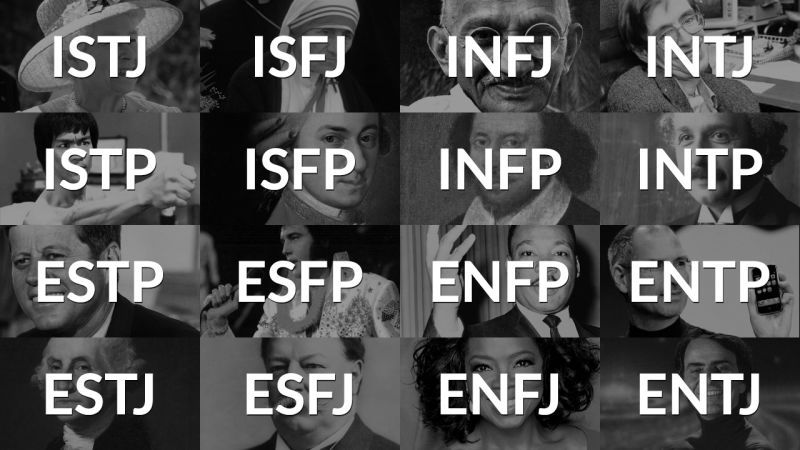Have you ever wondered why there are so many types of personalities?
I enjoy systems of classification, so personality tests have always been fascinating to me. I’ve looked at many different systems, but I tend to gravitate toward those based on the theories of Carl Jung, who attempted to break down human psychological differences into basic patterns that can be applied universally. The system boils the human personality down into four sets of dichotomies seen in how people interact with their surroundings.
Now, the best personality systems (in my opinion) recognize these dichotomies, but don’t lock people into their preferred method of processing information. I am an introvert, which means I prefer solitude to social interaction, but that doesn’t mean I can’t be social – it just takes more effort and intentionality.
In the Myers-Briggs Type Indicator system, this analysis produces sixteen basic personality types, seen in the four letter combinations above, with each letter signifying which side of each dichotomy that personality type gravitates toward.
The True Colors system is also based on these same sixteen types, but it simplifies and groups them into four colors. What I find interesting about this system is that everyone exhibits all four colors. Most people have one or two dominant colors, but anyone can exhibit the behavioral tendencies of any of the personality types in a given situation.
All models are wrong, some are useful.
George Box
Obviously any system that attempts to categorize something as complex as the human personality will be incomplete, inaccurate, and misleading in some ways. But I still find the process to be useful, and extremely interesting.
As a Christian, I find these differences among us to be especially interesting as we consider how and why God made us this way.
God created man with inherent personality traits that are morally neutral. Introversion is not better or worse than extroversion; they are simply different. Each dimension of our personality might mean we are inclined toward a certain set of poor decisions, which are evil, but that fact does not mean an INTJ is more evil than an ESFP. Each of us can leverage our predetermined personality traits in beneficial and harmful ways.
In my theology, mankind’s inherent brokenness is part of the first gift, as is our personality, and the circumstances we find ourselves in. Regardless of whether your personality is primarily influenced by your genetic code or the way you were brought up, you had no choice in either, so both were given to you and I think both play a role in establishing who you are, at least in regard to personality.
What is interesting to me about all of this is not that we have tendencies based on our personality.
It is far more interesting that we can choose to behave in ways that are contradictory to our personality.
For good or evil, we have all made choices that seem to fly in the face of our normal patterns. We break free of the system and make unexpected choices that can be either constructive or destructive.
Why is it that God made us with the ability to transcend our personality rather than give us a nature that determines the course of our lives with no real choices beyond what is pre-programmed into our brains?
It is worth noting at this point that some believe we are locked into a hard-wired nature, and that the illusion of choice is simply the result of inaccuracies within the personality models. I tend to believe otherwise.
We create a life based on the choices we make. I believe God gives us a basic set of preferences, but He also gives us the ability to break free of those preferences when we are motivated to do so. It might be costly, but we have that ability.
I’m not totally certain about this, but I tend to think that Jesus was a perfect harmony of all sixteen combinations, and could combine them at will in order to meet the needs of those He encountered. We see differences in how He responded to people throughout the gospels, and I believe that He wasn’t constrained or limited by a single personality type, but could flow in and out of them like someone who is fluent in multiple languages.
And in many ways, that’s truly what personality types are. They are languages that our souls speak. We can learn other languages, but we tend to have one we fall back on, our native tongue, so to speak.
So as we learn who we are and how we tend to process our environment, I believe we also learn how to interact with others, and teach them how to interact with us. There is no single “right” way to describe the variations in human personality, but we can see that there are differences. We were not all made the same, and that says a lot about how God wants us to grow. I cannot simply embrace the proclivities inherent in my personality and become the very best INTJ I can be. I must learn how an INTJ interacts with and ESFP or an ISTP, and help them understand how to interact with me.
So together, we learn and grow and see that God is so much more than how we process Him. We see through the eyes of those who process the world and God differently than we do. We drop the notion that we could ever truly perceive our environment as it is, and embrace the fact that our personality will always color the information we’re given. By coming together in community with people who see things differently than we do, we learn and grow and broaden our minds to the infinite colors of the world, and the God who made it.

